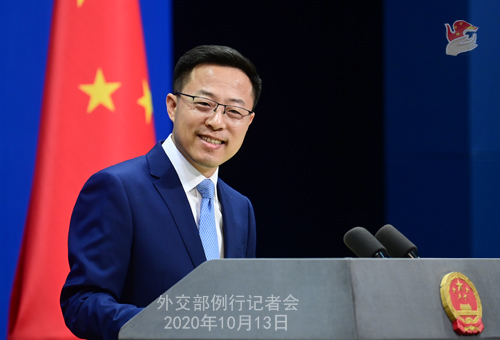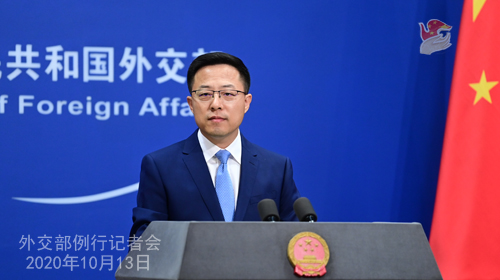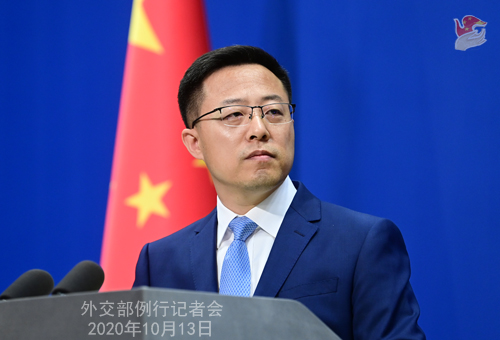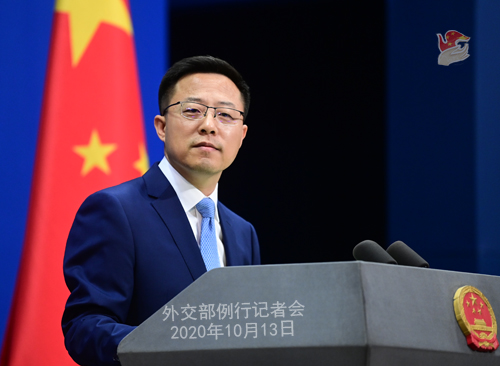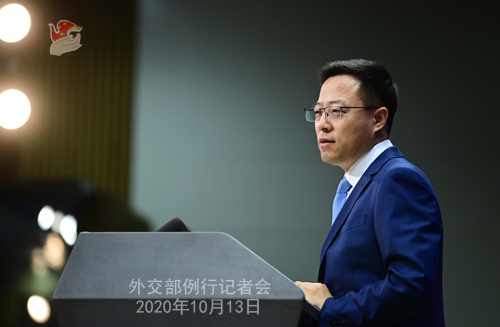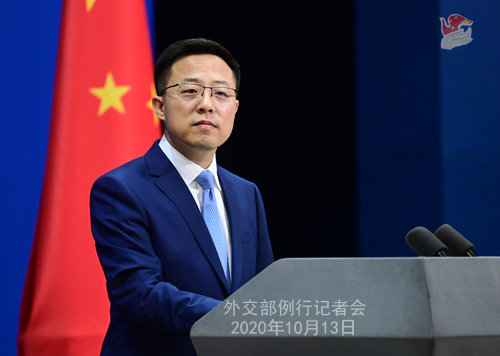| Foreign Ministry Spokesperson Zhao Lijian's Regular Press Conference on October 13, 2020 |
| 2020-10-13 18:52 |
|
China Review News: The results of the annual Arab Opinion Index (AOI), the largest opinion poll of its kind in the Arab world, were released with 28,000 respondents across 13 Arab countries including Saudi Arabia, Egypt, Algeria taking part. More than half of respondents hold positive attitudes towards Chinese foreign policy regarding Arab countries; Around 58% of respondents held negative views of US foreign policy towards Arab countries; over 70% of respondents disapproved of the US policies on Palestine, Syria, Iraq, Libya and Yemen; 81% of respondents believed that the US poses major threat to the Arab world security. What is your comment? Zhao Lijian: This poll shows that justice lies in the hearts of the people. Although some US politicians spare no effort to shirk blame and take advantage of various problems to stigmatize and vilify China, what is right cannot be wronged and what is wrong will always be wrong. The eyes of the people in these countries are bright as to discern the right and wrong. China's relationship with Arab countries, deeply rooted in the hearts of the people, is growing from strength to strength with the passing of time. It will withstand the test of history and time, and the mists created by all kinds of lies will not block its development. China has always firmly adhered to an independent foreign policy of peaceful development, which has been fully reflected in our development of relations with Arab countries. China and Arab countries enjoy traditional friendship. In recent years, China and Arab countries have deepened strategic mutual trust, expanded pragmatic cooperation in an all-round way, and strengthened friendly exchanges in various fields. The China-Arab States Cooperation Forum has become an important platform for the two sides to carry out collective dialogue and strengthen practical cooperation. At the ninth ministerial meeting of the Forum in July this year, the two sides reached important consensus on strengthening the China-Arab strategic partnership and working together to build a China-Arab community with a shared future in the new era and unanimously decided to hold a China-Arab summit in Saudi Arabia. In the face of the sudden outbreak of the pandemic, China and Arab countries have been helping each other with great sense of shared future and solidarity, setting a good example in the global fight against the pandemic and in the building of a China-Arab community with a shared future. So far, China has provided more than 1 million test kits and more than 18 million masks to Arab countries. China has sent medical expert groups to eight Arab countries to share diagnosis and treatment plans and treatment experiences unreservedly. The two sides have held more than 40 expert video conferences. China's vaccine cooperation with the United Arab Emirates, Egypt, Morocco and other countries has also made smooth progress. China is willing to work with Arab countries to continue to uphold solidarity and cooperation and jointly advocate peace, friendship and cooperation, thus benefiting the Chinese and Arab people and injecting more positive energy into safeguarding multilateralism and international fairness and justice.
China News Service: US Secretary of State Pompeo said in a recent interview with Fox News that the whole world believes that the threat from China needs to be taken seriously. He also lashed out at China on issues like the pandemic, data security and the environment. What is China's response? Zhao Lijian: Out of ideological prejudice and political self-interest, Pompeo has repeatedly stigmatized and discredited China, exaggerated the so-called "China threat", concocted and spread political lies and political viruses against China, and has become a spreader of false information, a creator of lies, and an instigator of hatred. His actions will only damage the national image and interests of the United States. China adheres to the Five Principles of Peaceful Coexistence and never interferes in the internal affairs of other countries. We uphold multilateralism and are committed to maintaining an international system with the United Nations at its core and an international order based on international law. We adhere to the rule of law and have joined almost all inter-governmental international organizations and international conventions. We oppose bullying and advocate dialogue instead of conflict, consultation instead of intimidation and win-win outcomes instead of zero-sum game. China has always been a staunch guardian of international fairness and justice. Who is sowing division all over the world and who is the real threat to the world? I believe that the international community will reach a fair conclusion. Here I would like to give a few examples: In the face of the pandemic situation, China has provided assistance to more than 150 countries and regions, joined COVAX, and actively supported WHO's crucial role in fighting the pandemic. The United States withdrew from WHO and voted against the COVID-19 resolution in the UN General Assembly. It chose to stand on the opposite side of 169 countries by openly flouting international cooperation against the pandemic. In order to meet the challenge of data security risks and contribute to improving global digital governance, China has put forward the Global Initiative on Data Security. The Chinese government has never asked Chinese companies to install back doors and provide overseas data to the government. What about the United States? When the old accounts of PRISM, Equation Group and Echelon system are yet to be settled, it has been revealed recently that the "Five Eyes" alliance led by the United States has asked the relevant technology companies to set up encrypted "back doors". The double standards of the United States could not be more conspicuous. In the face of the global climate change, China has announced that it will have carbon dioxide emissions peak by 2030 and achieve carbon neutrality by 2060. The United States has not ratified the Kyoto Protocol, withdrew from the Paris Agreement and dumped a large amount of garbage to developing countries. When will the huge arrears of the United States to the Global Environment Facility and its due contributions to the UNFCCC be paid? The United States owes an explanation to the international community. Reuters: Sources said that the US State Department had approved three arms sales to Taiwan. What is China's comment on this? Zhao Lijian: The United States seriously violates the one-China principle and the provisions of the three China-US joint communiqués, especially the August 17 communiqué, by selling arms to Taiwan, seriously interferes in China's internal affairs and seriously harms China's sovereignty and security interests. China firmly opposes this. China urges the US side to fully recognize the very damaging nature of its arms sales to Taiwan, abide by the one-China principle and the provisions of the three China-US joint communiqués, immediately cancel all arms sales plans to Taiwan, and stop arms sales to Taiwan and military ties between the United States and Taiwan. China will make a legitimate and necessary reaction in the light of the development of the situation.
The Phoenix: Recently, US Secretary of State Pompeo and other senior officials said that transactions with large amounts of Chinese investment are not good transactions and all need to be alert to the "debt trap" created by the Belt and Road Initiative. What is your response? Zhao Lijian: Pompeo openly regards "lying, stealing, cheating" as the "glory" of the United States. He is like a broken record, playing the same "anti-China" tunes over and over again. The so-called "debt trap" is another example of America's "lying diplomacy". So far, no Belt and Road partner has fallen into any so-called debt trap because of its cooperation with the BRI. On the contrary, many partners have spoken highly of the BRI. For example,on October 9, Sri Lankan President Gotabaya publicly refuted the claim again that China had set up a debt trap to control Sri Lanka. China has made great contributions to Sri Lanka's infrastructure construction and development. Sri Lanka is willing to make every effort to promote the joint construction of the key cooperation projects under the Belt and Road Initiative, such as the comprehensive development of Colombo Port City and Hambantota Port, so as to raise mutually beneficial cooperation between the two countries to a higher level and better benefit the people of the two countries. As is known to all, BRI cooperation adheres to the principle of extensive consultation, joint contribution and shared benefits and is advanced through open, green and clean approaches and aims to achieve development featuring high standards, livelihood improvement and sustainability. Relevant projects are conducted through cooperative efforts to ensure sustainability in economic, social, fiscal, financial and environmental sectors. China believes that those who view and analyze the BRI in an objective and unbiased way will arrive at a right conclusion. Those that are cooperating with China are in the most suitable position to comment on how such cooperation is going, and they have given their unequivocal answer by signing more than 130 BRI cooperation documents and seeking to expand cooperation with China. All attempts to smear and slander will fade into nothing in front of these facts. Bloomberg: On the Australian coal issue, Chinese power stations, steel mills and ports have been told to stop taking in Australian coal, Bloomberg reported citing people familiar with the matter. What is the purpose of these orders? And how does China respond to Australian concerns that the import controls are retribution for diplomatic disputes? Zhao Lijian: I've also taken note of relevant reports. I'll refer you to competent authorities for the specifics. As we've repeatedly stated, China's position on developing relations with Australia is consistent and clear. Sound and stable China-Australia ties serve the common interests of both, but it takes efforts from both sides. We hope Australia can work together with China for the same goal, uphold mutual respect and equality, and do more things conducive to advancing bilateral cooperation and mutual trust and in keeping with the two sides' comprehensive strategic partnership.
Shenzhen TV: Australian media reported that Premier of New South Wales Gladys Berejiklian has admitted she's concerned that China Railway Rolling Stock Corporation, the company contracted to build new trains for Sydney, had been identified as a beneficiary of Uyghur labour. The original contract for the trains was signed back in 2006 under a Labor government. "Obviously we're concerned with that and if there's anything further we need to do, I'm sure Transport for NSW will take that action, Ms Berejiklian said. What is China's comment on that? Zhao Lijian: We have noted relevant reports. My colleagues and I have pointed out on many occasions that the so-called "forced labor" issue in Xinjiang is a rumor created by a few anti-China media and organizations such as the Australian Strategic Policy Institute. Such a rumor has not a shred of fact in it. I would like to stress once again that all the people in workforce in Xinjiang, regardless of ethnic origin, race, gender or religious belief, enter into labor contracts with their employers and establish legally protected labor relations in accordance with the Labor Law, the Labor Contract Law and other related laws and administrative regulations. There is no such thing as "forced labor". Some anti-China forces try to use this made-up topic to smear China's image, interfere with and undermine China's bilateral relations with other countries, and seek their own political interests. Their despicable plot is doomed to fail. We hope that the Government of New South Wales and people from all sectors of society will keep their eyes open, make a right judgment, resist fallacies concocted by restless anti-China institutions, and create favorable conditions and atmosphere for China-Australia cooperation. I would also like to point out that Chinese enterprises have always conducted economic, trade and investment cooperation with Australia on the basis of observing local laws and following the principle of mutual benefit, which has already brought tangible benefits to both sides. China will resolutely safeguard the legitimate rights and interests of Chinese companies and China's national image and interests. The Globe and Mail: Today is the 50th anniversary of the establishment of relations between Canada and China. What phone calls or other messages have been arranged between China's leadership and Canada's leadership to mark this occasion? Zhao Lijian: Since the establishment of diplomatic ties 50 years ago, China-Canada relations have made great progress thanks to the joint efforts of both sides. China has long been Canada's second largest trading partner, and bilateral cooperation in economy, trade, people-to-people exchanges and multilateral areas has yielded fruitful results, bringing tangible benefits to the two peoples. Since the outbreak of COVID-19, China and Canada have supported and helped each other and actively cooperated in the fight against COVID-19. There's no historical baggage or conflicts of interest between China and Canada, and the new circumstances only serve to expand, not narrow, areas for cooperation between China and Canada. The two sides share broad common interests and broad space for cooperation in upholding multilateralism, promoting free trade and addressing climate change. The development of China-Canada relations over the past 50 years shows that only by earnestly adhering to the principles of mutual respect and treating each other as equals can China-Canada relations achieve steady and lasting growth. China values its relations with Canada and is committed to developing its strategic partnership with Canada. The current difficulties in China-Canada relations are not what China wants to see. The root cause is the unreasonable detention by the Canadian side at the request of the US of an innocent Chinese citizen Meng Wanzhou who has not violated any Canadian law. Whoever tied the knot is responsible for untying it. The Canadian government should take immediate and effective measures to correct the mistake, allow Ms. Meng Wanzhou to return home safely at an early date, remove the stumbling block to the development of China-Canada relations and bring it back to the right track.
Bloomberg: My question is about India. We have a report saying that India has opened a series of new bridges, many of them providing all-weather access to its disputed border with China, 8 in Ladakh province, 8 in Arunachal Pradesh and 4 in the Himalayan region. So what's the foreign ministry's view? Zhao Lijian: First, China doesn't recognize the so-called "Ladakh Union Territory" illegally set up by India or the "Arunachal Pradesh", and opposes infrastructure building aimed at military contention in disputed border areas. Based on the consensus reached by the two sides recently, neither side should take any action that might complicate the situation at the border region, so that bilateral efforts to ease tension will not be undermined. For a while, the Indian side has been stepping up infrastructure building and military deployment along the border with China. This is the root cause of tensions. We urge the Indian side to earnestly implement the consensus reached by the two sides, refrain from taking actions that will complicate the situation, and take concrete measures to safeguard peace and tranquility along the border. Global Times: AFP reported that the Five Eyes, cooperating with Japan and India, demand that Signal, Telegram and some other tech companies insert "backdoors" in encrypted apps to allow law enforcement agencies the access they say they need to police online criminality. What's your comment? Zhao Lijian: Without any evidence, the Five Eyes have long been wantonly accusing Chinese companies of installing "backdoors" in products, which they say threaten the security of supply chains and personal privacy. However, they baldly ask companies to insert "backdoors" in encrypted apps; it is typical double standard. It not only reveals those countries' hypocrisy, but also proves that there are political motives behind their action, and that their real intention is to suppress foreign companies. What's worth noting is that the Five Eyes is the world's biggest intelligence alliance. As the alliance now openly asks telecom companies to insert "backdoors" in their products citing "policing online criminality", it needs to answer this question: is fighting crimes or collecting intelligence its true intention? Given that the US, one of the Five Eyes, has been carrying out large-scale, indiscriminate cyber surveillance all over the world, the international community has reason to be alert to the true motive of the Five Eyes. China recently put forward the Global Initiative on Data Security and called on ICT companies to not install backdoors in their products and services. Should need arise to obtain overseas data out of law enforcement purposes such as combating crimes, countries should do it through judicial assistance or other relevant multilateral and bilateral agreements. China calls on all countries to support the Global Initiative on Data Security, jointly formulate global rules on data security, and together safeguard cyber security. NIKKEI: Chinese Coast Guard vessels have been wandering around Diaoyu Dao for a long time, according to some media reports. The Japanese government said that it may taken some measures in response. What is your response? Zhao Lijian: Diaoyu Dao and its affiliated islands are China's inherent territory. Patrolling and carrying out law enforcement activities in the relevant waters are also China's inherent right. The Japanese side should respect this. The Globe and Mail: Just one more question related to the 50th anniversary. Recently Pew Research put out survey results, showing that many Canadians hold an unfavorable view of China. What is your comment? Zhao Lijian: I have noted this opinion poll you mentioned. You said that it showed more Canadians now hold negative opinions towards China. I want to tell you that it is mainly because of the Meng Wanzhou incident I just mentioned. These politicians in Canada should think it over: why are more people in Canada now viewing China unfavorably? It is several Canadian politicians and the Canadian government that are at the bottom of this.
|
| |||||||||||||||
|
|||||||||||||||


